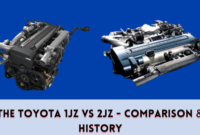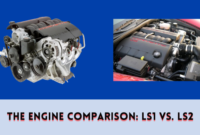The Toyota Camry vs Toyota Corolla: Performance – Issues and Reliability. Toyota Camry and Corolla are among the best-selling vehicles in the world. In reality, as of 2019, the Corolla was the best-selling model worldwide, with the Camry coming in fifth. Toyota’s success with these vehicles stems from the production of high-quality, dependable engines with lengthy lifespans at a reasonable price. The Corolla has traditionally been regarded as the Camry’s less expensive “little brother.” However, what the Corolla lacks in comparison to the Camry’s larger engine and body, it makes up for in efficiency. It’s difficult to be too critical of both infamous vehicles, and both are excellent choices for people looking for dependable daily drives with high mileage.
The Toyota Corolla was introduced to the automotive industry in 1966, and by 1974, it had become the best-selling automobile in the world. Toyota hoped to capitalize on the success of the Corolla by producing the bigger Camry model in 1982. The first Corolla used a 1100 cc k-pushrod engine, while the Camry had a 1600 cc t-series 4-cylinder engine. A big cry from the 139-169 hp standard on the 2022 Corolla and 202-301 hp standard on the 2022 Camry.
We will concentrate on the distinctions between the contemporary Toyota Camry and Corolla models throughout this tutorial. The differences in specifications, features, dependability, and price will be evaluated to differentiate these two identical models. But first, let’s take a closer look at the specifications and performance differences between these two models, which will help you determine which infamous Toyota is the best option for you.
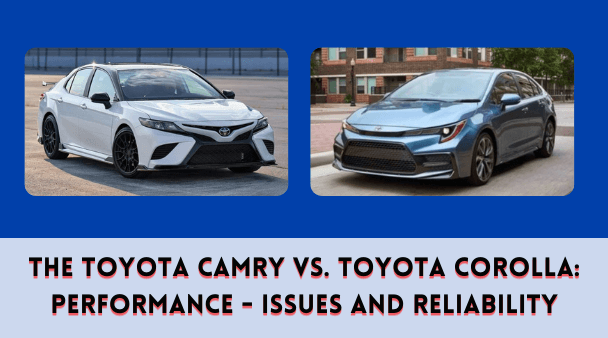
Camry vs. Corolla Specifications and Performance
Toyota’s best-selling models are differentiated in terms of power and performance. We will analyse each model’s engine and overall capabilities in order to fully examine those distinctions. Now, let’s go into some of the basic specs of the current generation of Toyota Corolla and Camry vehicles, beginning with the engine specs for the 2022 Corolla.
Toyota Corolla 2022:
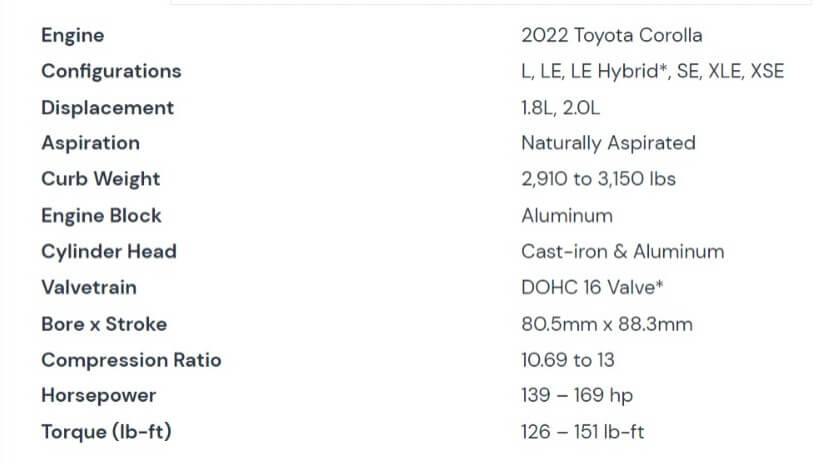
The Toyota Corolla 2022 is available in nine various configurations, including Apex and Nightshade editions. The base L configuration costs $20,075 and the XSE Apex Edition costs $28,630. The Corolla’s engines are all naturally aspirated and use a DOHC 16 valvetrain. Toyota emphasises economy, dependability, and longevity in the design of the Corolla, providing customers with a cost-effective option. When compared to similarly-sized entry-level cars, we believe the Corolla is a solid choice for any driver looking for an affordable daily driver. However, due to modifications in the fuel system and engine components, some of the engine specs stated above do not applicable to the hybrid model. The specs for the 2022 Toyota Camry are listed here, as well as some of the powertrain variations between it and the Corolla.
Toyota Camry 2022:
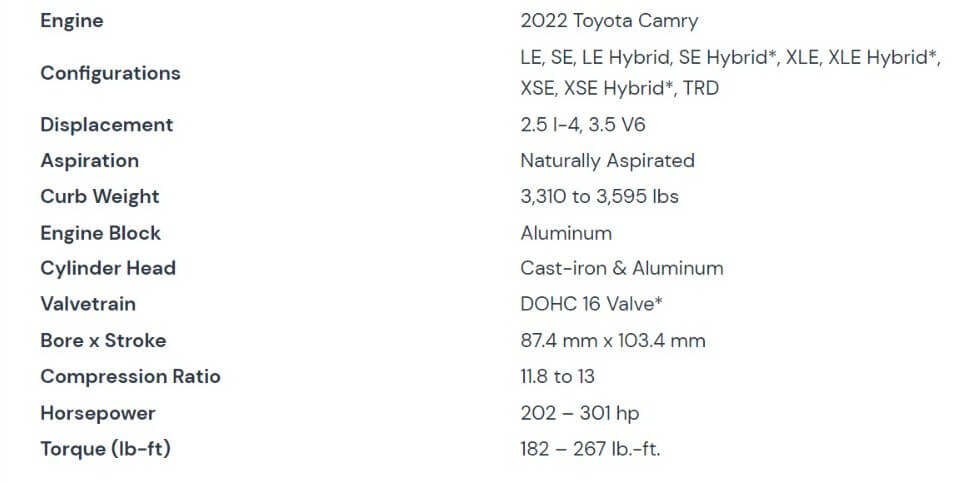
Because of variations in the fuel system and engine architecture, some of these characteristics do not apply to hybrid systems. The 2022 Toyota Camry is also available in nine different trim levels, with prices ranging from $26,420 for the LE basic to $33,945 for the XSE Hybrid. Because the Toyota Camry costs more than the Corolla, customers may expect more power, more special amenities, and a larger overall body design. With that said, let’s go over the pricing for each setup below.
Pricing Comparison: Camry vs Corolla
The starting prices for each 2022 Toyota Corolla configuration are as follows:
- L – $21,200
- LE – $21,650
- SE – $21, 940
- Nightshade is worth $23,940.
- LE Hybrid – $24,775
- XSE – $24,890
- XLE – $25,600
- Apex – $26,345
Finally, the following are the starting pricing for each 2022 Toyota Camry configuration:
- LE – $26,420
- SE – $27,960
- LE Hybrid costs $28,505.
- SE Hybrid costs $30,040.
- XLE – $31,170
- The XLE Hybrid costs $33,395 dollars.
- XSE – $31,720
- XSE Hybrid costs $33, 945.
- TRD – $33,485
Finally, let’s look at some of the distinctions between the Toyota Camry and Corolla models that aren’t related to price.
Differences Between the Toyota Camry and the Toyota Corolla
At first glance, the Camry and Corolla appear to be nearly equal in terms of power, performance, and general appearance. Nonetheless, with 18 possible configurations and other alternative options, both models offer a variety of elements and additional components.
The size difference between the Camry and Corolla is one of the most noticeable. The Camry is approximately 192 inches long, while the Corolla is approximately 182 inches long. With that extra length, the Camry provides more internal space and overall cargo space than the Corolla. For example, the cargo capacity in the 2020 Camry is 15.1 cubic feet, whereas the cargo space in the Corolla is only 13.1 cubic feet. Furthermore, the Camry’s curb weight ranges from 3,310 to 3,595 lbs, whereas the Corolla’s ranges from 2,910 to 3,150 lbs. In general, drivers may prefer the Corolla to the Camry due to its lower price and higher fuel efficiency. However, for those looking for more overall power, the Camry engine produces more horsepower and torque.
Both vehicles have slightly different fuel economy ratings, with the 2022 Camry rated at 28 city and 39 highway. In comparison, the 2022 Corolla is rated at 31 city and 40 highway mpg. Because of the larger engine and overall body size of the Camry, this minor distinction appears virtually obsolete. Please see our engine specs above for more differences between the two models aside from size, fuel efficiency, load room, and performance value.
Toyota Camry vs Toyota Corolla Dependability
Toyota Camry and Corolla are known with great dependability at an affordable price. Both vehicles are consistently ranked among the top five in their respective categories (the Camry is classified as mid-size, while the Corolla is classified as compact). In general, drivers report a pleasant experience, with both models achieving great mileage without requiring major or costly maintenance. Consumers anticipate that both models will reach the 150,000-mile barrier with minimal maintenance and no major difficulties. However, no engine is flawless, and adequate repairs and maintenance are critical to engine longevity. Aside from the flaws and problems listed below, we would have to evaluate the current generation of Camrys and Corollas as dependable, wonderful choices for dependable engines.
Several recalls have been issued for both the Toyota Camry and the Toyota Corolla. Toyota recently recalled 227,000 Camrys due to brake system problems. In addition, there have been recent recalls for the Corolla, including rear seat belt locking issues for 2018-2020 vehicles. On paper, these may appear to be major safety concerns. Both versions, however, have an amazing design in terms of safety and dependability. Regardless, both engines might have a variety of issues. In conclusion, we will examine at some of the most typical reporting issues and top complaints regarding the current generation Camry and Corolla below.
Most Common Complaints and Issues with the Current Generation Corolla
Minor technical issues regarding complaints about speed control systems are possible in the 2021 Toyota Corolla. However, it is crucial to remember that many current-generation Corolla drivers may not experience all of these concerns. They are, nevertheless, prominent enough for us to investigate and report on.
High oil consumption and numerous oil leaks are two of the most regularly cited faults with the latest Corolla models. It may be difficult to pinpoint the source of these leaks or consumption concerns, resulting in costly diagnostic testing and repairs as well as excessive time spent in the repair shop.
Transmission Issues: Some drivers claim transmission sliding, clunky transmissions, and shifting problems in their current generation Corollas. Transmission problems can quickly escalate into some of the most expensive car repairs, especially if a total replacement is required.
Related : The Nissan Versa Reliability and Problems
Engine Starter Problems
Engine starter problems are a regular recurring issue with many current generation Corollas. Corroded or weak batteries might be a source of starter problems. However, more serious problems such as broken alternators, broken starter motors, faulty sparkplugs, clogged air filters, and fuel pump failures can also cause starting problems. As a result, diagnosing this problem on your own might be extremely inconvenient and costly.
Most Common Complaints and Issues with the Current Generation Camry
Again, not all of the issues listed below will affect every current-generation Toyota Camry. Nonetheless, they are widely publicized enough for us to investigate and debate.
Tire Issues
Many drivers complain that the latest generation of Camrys do not come with high-quality tires from the dealership. In some road conditions, this might lead to a difficult driving experience and a lack of driver safety. Unfortunately, many Camry drivers must change their tires more sooner than expected. Regardless, it is critical to replace tires as quickly as feasible rather than driving on risky tires.
Electrical System difficulties
Various Camry users have reported electrical difficulties ranging from damaged Bluetooth and audio components to a problematic cruise control system. Many dealerships will identify these problems as factory flaws and provide quick fixes under warranty. However, for drivers who do not have a warranty, these technological issues can turn into pricey surprise repairs.
Components within the brake vacuum pump have been discovered to be problematic, prompting Toyota to recall 227,000 Camry cars from the 2018-2019 production years. A faulty brake vacuum pump does not imply that the entire braking system is rendered useless, and most vehicles will continue to stop safely. However, this problem has the potential to develop into a major safety fault, rendering the braking mechanism ineffective.
Many of these difficulties, particularly those concerning safety, may appear to be major red lights in terms of dependability and durability. However, many of these issues can be avoided with regular upkeep and repair. In reality, the Camry and Corolla both rank quite high in terms of safety and dependability. Just goes to show that no automobile is flawless, and every engine has weaknesses, particularly with heavy miles and wear over time.
Toyota Camry vs Corolla Comparison
For good reason, the Camry and Corolla are among the best-selling cars in the world. These models continue to rule the modern car industry because they are cost-effective and practical options with above-average features and overall performance. Furthermore, the 2022 Toyota Camry and Corolla are also well rated in terms of safety. Toyota did, however, recall roughly a quarter-million Camrys in both 2018 and 2019 models owing to brake system faults. Because of the relatively large number of reported engine problems, the most problematic years for the Camry are 2008, 2013, 2014, and 2015. Some of the issues we listed are the result of poor car maintenance, while others are direct issues from the dealership that should raise consumer concerns.
With that said, we must emphasize the benefits of the Toyota Camry and Corolla, as well as their different variants. Both versions have an incredibly good overall value for their low price. The Toyota Camry and Corolla are known with excellent gas mileage, durability, dependability, and practicality. These vehicles have been and will continue to be a benchmark for other automakers to strive after.
To summarize, it’s difficult to find many defects with either of Toyota’s globally best-selling models without thoroughly studying them. Both the Camry and Corolla models impress us with their practicality, dependability, and price. They are a good option for anyone looking for a dependable everyday vehicle.
Let us know in the comments below which of the Camry and Corolla models you favor, and whether you believe these incredibly popular sedans live up to their hype and popularity.





